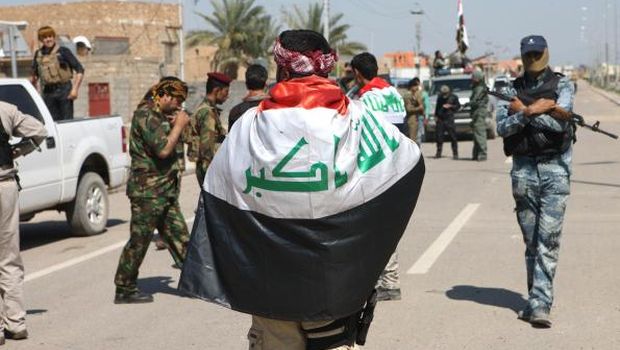
Wrapped in the Iraqi flag, police and security gather along Street 60 after the southern districts of the city of Ramadi, the capital of the Anbar province, were recaptured by government forces from militants, on March 16, 2014. (AFP Photo/Azhar Shallal)
Baghdad, Asharq Al-Awsat—The government of the Iraqi province of Anbar announced plans to reopen entrances to the city of Ramadi on Sunday, following two months of violent clashes in and around the city.
Anbar Governor Ahmad Khalaf Al-Dulaimi said: “Preparations were being made in coordination with the Iraqi army to reopen the entrances of Ramadi to ease the movement of its people.”
Dulaimi added in a statement on his Facebook page: “The Anbar government is waiting for funds from the central government to distribute among people who suffered losses from military operations and the families who were displaced from their homes.”
The province, and its two major cities of Anbar and Fallujah, has been the site of intense fighting between Iraqi government forces and tribal militias on one side and insurgents on the other since the final days of 2013.
Insurgents, including some linked to Al-Qaeda, expelled government forces from Ramadi and Fallujah after over a year of rising sectarian and political tensions in the largely Sunni province. Local residents taking part in Anbar long-term occupations of public spaces in protest at what they claimed was sectarian bias on the part of the central government in Baghdad, led by Shi’ite Prime Minister Nuri Al-Maliki.
As well as those killed in the fighting, tens of thousands of Iraqis are reported to have been displaced by the violence.
While the Iraqi authorities claimed to have recaptured Ramadi, violence continues elsewhere in the province.
The Iraqi Armed Forces’ Anbar Operations Command announced on Saturday that a security unit had killed eight members of the Islamic State of Iraq and Syria (ISIS) group. It also said the army unit destroyed an ISIS hideout based on property owned by the leader of the Jamilah tribe, Sheikh Rafi Mishhan Al-Jamili, in eastern Fallujah, 40 miles west of Baghdad.
A statement issued by the Iraqi security forces said: “A rapid response unit killed four ISIS members and destroyed a vehicle which was loaded with arms and ammunition, and burnt down a motorboat used by the terrorists, in a security operation in eastern Fallujah.”
The statement added: “The unit was also able to destroy a hideout of a terrorist group in Al-Karmah, eastern Fallujah and killed four terrorists and destroyed another vehicle.”
Sheikh Ghassan Al-Ithawi, imam and preacher of the Al-Ashra Al-Mubashareen Mosque in Ramadi, told Asharq Al-Awsat: “The situation in Ramadi is relatively stable compared to recent weeks, and the deceit of the people by ISIS has ended, and that it is very important in order to help life return to normal in Ramadi and the majority of Anbar towns which suffered greatly in recent times from murder and displacement.”
Ithawi added that “a number of sophisticated operations were carried out by army units with the help of the tribes which weakened the terrorist organizations,” and that 70 percent of Ramadi areas had now been secured.
Meanwhile, a number of Iraqi MPs have said criticized the government’s focus on the budget, rather than the crisis in the western province.
Mazhar Al-Janabi, an MP in the Mutahidoun bloc in Iraq’s parliament, told Asharq Al-Awsat: “There is a case of double standards towards the Anbar crisis and the budget with regards to the behavior of the National Alliance and the Kurdistan Alliance. The Shi’ite National Alliance linked its attendance of the parliament sessions to the inclusion of the budget on the agenda, while the Kurdistan Alliance refused to attend the sessions if the budget was included without meeting its own demands, and both parties ignored a humanitarian crisis . . . in Anbar.”
Janabi added: “The Anbar issue is more important and its resolution would solve most problems in Iraq, and therefore, we find this to be a deliberate negligence of the issue.”
MP Ibrahim Al-Mutlaq, a member of the Iraqiya coalition led by Deputy Prime Minister Saleh Al-Mutlaq, said the government was responsible for complicating the Anbar crisis.
During a news conference at the parliament building on Saturday, he said: “The Anbar issue should take precedence over all other issues, despite the fact that we recognize the importance of the budget issue.”
He added: “The government was responsible for the delay in ratifying the budget when it turned its back on the suffering of the people in Anbar, and it will not move one step towards resolving this issue.”
